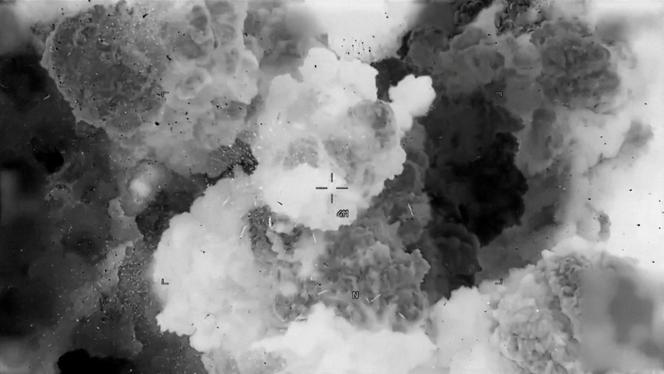
US airstrikes targeting an oil port held by Yemen’s Houthi rebels killed 58 people and wounded 102 others, the rebel group said on Friday, April 18, marking the single-deadliest known attack under President Donald Trump’s new campaign targeting the rebels. Assessing the death toll of Trump’s campaign, which began on March 15, has been incredibly difficult, as the US military’s Central Command has so far not released any information on the campaign, its specific targets and how many people have been killed. Meanwhile, Yemen’s Houthi rebels strictly control access to areas attacked and don’t publish information on the strikes, many of which likely have targeted military and security sites. However, the strike on the Ras Isa oil port, which sent fireballs shooting into the night sky, represented a major escalation for the American campaign. The Houthis also immediately released graphic footage of those killed in the attack.
The Houthis denounced the US attack. “This completely unjustified aggression represents a flagrant violation of Yemen’s sovereignty and independence and a direct targeting of the entire Yemeni people,” the Houthis said in a statement carried by the SABA news agency they control. “It targets a vital civilian facility that has served the Yemeni people for decades.”
The Iranian-backed Houthis later on Friday launched a missile toward Israel that was intercepted, the Israeli military said. Sirens sounded in Tel Aviv and other areas.
Iran, meanwhile, condemned the US air strikes on Ras Isa. Foreign ministry spokesman Esmaeil Baqaei “strongly condemned the barbaric US air strike on Yemen’s Ras Isa Port,” describing it as “an example of aggressive crime and a blatant violation of the fundamental principles of the UN Charter.”
A ‘source of fuel’ for the Houthis
In a statement, Central Command said that “US forces took action to eliminate this source of fuel for the Iran-backed Houthi terrorists and deprive them of illegal revenue that has funded Houthi efforts to terrorize the entire region for over 10 years.” “This strike was not intended to harm the people of Yemen, who rightly want to throw off the yoke of Houthi subjugation and live peacefully,” it added.
The Ras Isa port is the terminus of an oil pipeline stretching to Yemen’s energy-rich Marib governorate. Yemen’s oil exports have been halted by the decade-long war, and the Houthis have used Ras Isa to bring in oil. On April 9, the US State Department issued a warning about oil shipments to Yemen. “The United States will not tolerate any country or commercial entity providing support to foreign terrorist organizations, such as the Houthis, including offloading ships and provisioning oil at Houthi-controlled ports,” it said.
Chinese satellite firm accused of aiding Houthi attacks
The war in Yemen, meanwhile, further internationalized as the US alleged a Chinese satellite company was “directly supporting” Houthi attacks, something Beijing did not immediately acknowledge. US State Department spokesperson Tammy Bruce, in a briefing with journalists, accused Chang Guang Satellite Technology Co. Ltd., a commercial satellite image provider, of “directly supporting Iran-backed Houthi terrorist attacks on US interests.”
Bruce did not elaborate in detail, but acknowledged a story by The Financial Times that quoted anonymous American officials saying the firm linked to the People’s Liberation Army has provided images allowing the rebels to target US warships and commercial vessels traveling through the Red Sea corridor. “Beijing’s support, by the way, of that company, the satellite company, even after we’ve engaged in discussions with them about this (…) certainly contradicts their claims of being peace supporters,” Bruce said.
Help us improve Le Monde in English
Dear reader,
We’d love to hear your thoughts on Le Monde in English! Take this quick survey to help us improve it for you.
Take the survey
The US Treasury sanctioned Chang Guang in 2023 for allegedly providing satellite images to the Russian Wagner Group mercenary force, as it fought in Ukraine as part of Russia’s full-scale invasion. However, it remains unclear just how linked, if at all, Chang Guang is to the Chinese government.
A spokesman for Beijing’s foreign ministry said, on Friday, that he was “not aware of the situation” when asked about the US accusations. “It is clear to the international community who is promoting peace and dialogue to ease tensions, and who is imposing sanctions and pressure to escalate them,” spokesman Lin Jian added at a press conference.
Le Monde with AP and AFP
Vous pouvez lire Le Monde sur un seul appareil à la fois
Ce message s’affichera sur l’autre appareil.
-
Parce qu’une autre personne (ou vous) est en train de lire Le Monde avec ce compte sur un autre appareil.
Vous ne pouvez lire Le Monde que sur un seul appareil à la fois (ordinateur, téléphone ou tablette).
-
Comment ne plus voir ce message ?
En cliquant sur « » et en vous assurant que vous êtes la seule personne à consulter Le Monde avec ce compte.
-
Que se passera-t-il si vous continuez à lire ici ?
Ce message s’affichera sur l’autre appareil. Ce dernier restera connecté avec ce compte.
-
Y a-t-il d’autres limites ?
Non. Vous pouvez vous connecter avec votre compte sur autant d’appareils que vous le souhaitez, mais en les utilisant à des moments différents.
-
Vous ignorez qui est l’autre personne ?
Nous vous conseillons de modifier votre mot de passe.
Lecture restreinte
Votre abonnement n’autorise pas la lecture de cet article
Pour plus d’informations, merci de contacter notre service commercial.